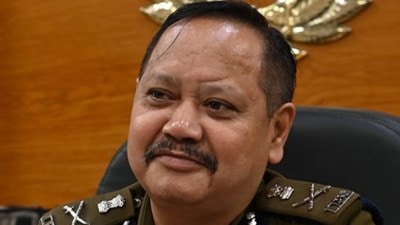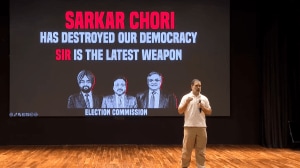‘When we think policy, we think capacity, not ideas. Hardware, not software. That’s wrong’
Infosys co-founder Nandan Nilekani is a man of many parts. An “accidental entrepreneur”, a determined philanthropist, and, as is clear in his new book Imagining India...

Infosys co-founder Nandan Nilekani is a man of many parts. An “accidental entrepreneur”, a determined philanthropist, and, as is clear in his new book Imagining India, a deep thinker about policy. He’s convinced he needs to get new ideas out there, and he told The Sunday Express what some of them are.
On his book:
It’s about India, and ideas… I wouldn’t have written it if it didn’t have something nobody has previously said in each chapter. I’m a value-for-money guy. This book is value for money — and for your time in reading it. It would have to be, or it wouldn’t be value for my time in writing it. I would have watched Rock On instead.
On philanthropy in India:
The Tatas, the Birlas — Mahim causeway in Bombay was built by Lady Jeejeebhoy in the 19th century. That stopped during the socialist era — no new wealth was being created, so who’d give it away? People don’t do that with wealth they inherit, because they don’t think it’s theirs to give away. Now, we need some serious philanthropy to start, not the little driblets we see. Society will let you make money only as long as it thinks you are valuable. You don’t contribute, society will take your right to make money away. Look at the US, a hundred years ago. They had robust capitalism. Carnegie, Mellon, Morgan — these men were dadas. But they gave it all away. So capitalism was made palatable, and survived.
On how to create new wealth:
We need first-generation wealth. We don’t have any Horatio Alger stories, about blue-collar guys making good in the system. We don’t have that mythology, because our labour system is dysfunctional. We’ve created a monster. 93 per cent disorganised, 2 per cent unionised. It helps every interest group, and shafts the common worker.
On failing to sell reform:
We haven’t presented reform as a matter of access for the common worker. It’s about opportunities opening up, about destroying vested interests. This is a failure of communication.
On lessons from the crisis:
What we really need to see in this crisis is that we’ve worked around more fundamental reform. We’ve been lulled by 8 per cent growth for years into thinking that we don’t have anything left to do. But actually, we had cheap credit, liquidity coming in. Now that’s gone. So back to basics. Learn the right lessons, not the wrong ones, like in Sonia Gandhi’s speech yesterday.
On youth and reform:
There’s no going back on reform. The genie’s out of the bottle, young people expect it. In any case, policy under-reflects our youth. They are so hugely aspirational. In my book, I tell this story: my wife asked in several villages what the kids wanted to do when they grew up. Not one said “farmer”. They want a new life. They watch TV, they’re connected, so of course they will.
On the urgency of Indian demographics:
We’re a young country. We need to take advantage of the bulge of young people, because if we miss it then we’re in trouble. Here’s an idea you won’t find somewhere else: our demographic bulge is actually double-humped, like a camel. The South had its burst of young people already. The North is starting now. The central challenge for the country is opening up reform there, spreading access, giving those youngsters opportunities.
On Nehru:
I did a frequency analysis on the book. I ran the algorithm, and one name stood out: Nehru’s. This is a book about ideas, and he created our ideas. Universal access to politics. Secularism. Not recognising class. Planning. Yes, this is a book about our future, but we can’t get there without looking at the past.
On empowering cities:
I care about cities. We recognise their importance now, but it wasn’t always so. For two reasons: the first was the idea that the ideal was the village republic, that the true India was rural. The second was that the cities were associated with the British. So we got accidental cities. And they were starved. I use the hourglass metaphor in the book: state-level politicians were scared of a strong centre and a strong local level, so they strangled cities and panchayats. The third level always got shafted. Besides, cities are where the money is made, which CM would give that up? Disempower them politically and financially, and they can’t manage anything, and we get a mess. So what happens? Our public utilities don’t get built, our public spaces disappear. Look at Bangalore. All the lakes are going. I remember when Shivaji Bus Stop was a lake.
On planning confusion:
Take ID cards. We need a universal system. The finance ministry has PAN cards, Home has MNIC, the planning commission has the unique ID project. We need to get sensible, stop thinking in silos. I’m writing a book, not a design document, but I can lay out the steps. For example, get every person a bank account. Then benefits can be direct. No more PDS wastage.
On what he brings to policy thinking:
When we think of policy, we think of capacity, not ideas. We think of hardware, not software. That’s wrong. I know how much the back-end matters. We need new ideas, and we need to leverage our technical know-how to get there. Once we do, we’ll see democracy’s a comparative advantage. An open society is one where information flows freely, where access is easier.



- 01
- 02
- 03
- 04
- 05




























